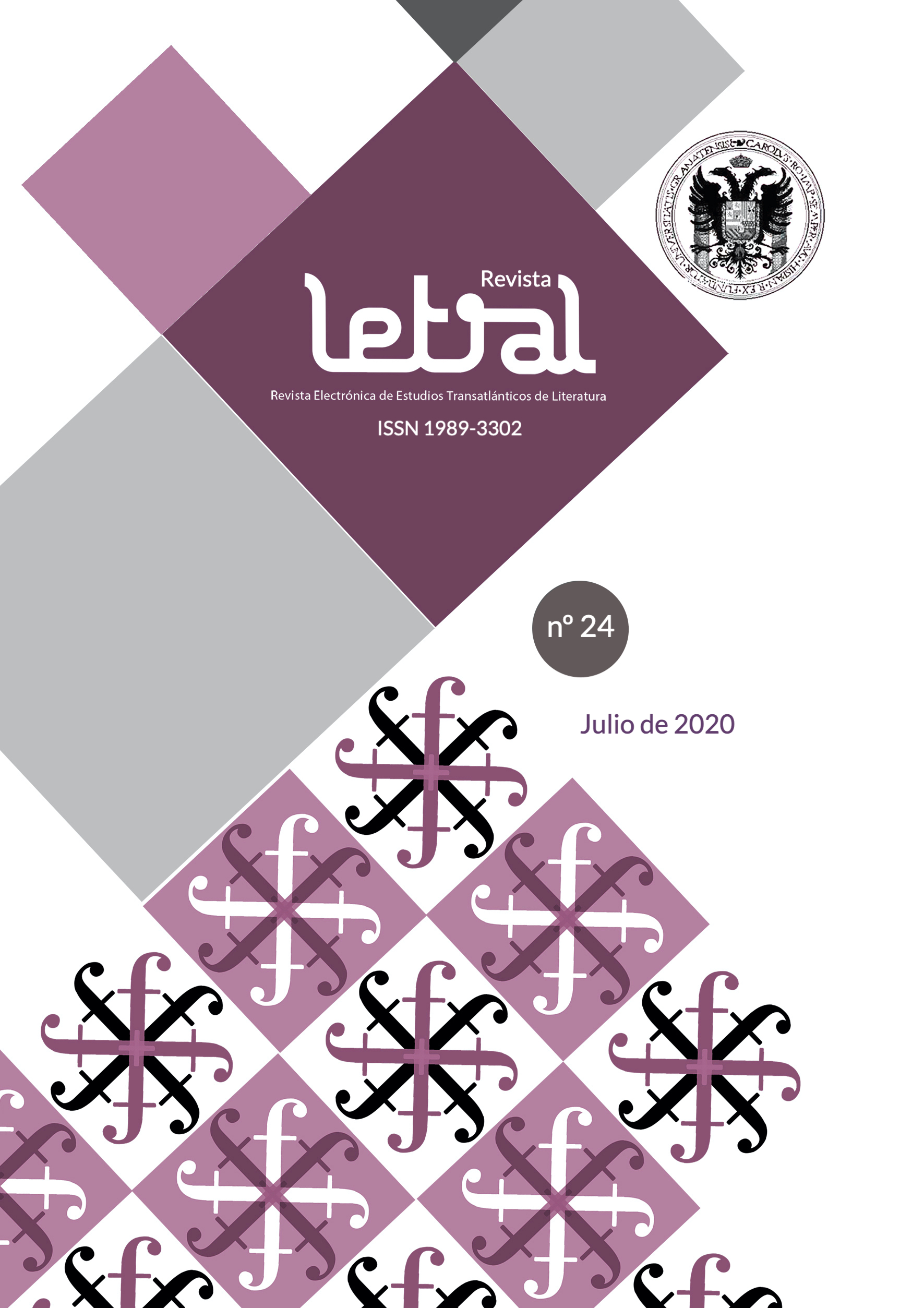El género epistolar en Respiración artificial de Ricardo Piglia: teoría, utopía y complot
DOI:
https://doi.org/10.30827/rl.v0i24.13866Palabras clave:
Ricardo Piglia, narrativa argentina del siglo XX, género epistolar, transformación funcional.Resumen
Respiración artificial (1980), del escritor argentino Ricardo Piglia (1940-2017), constituye una narración híbrida donde el ensayo se imbrica en el diálogo y la correspondencia, modos que se combinan a su vez con la biografía, la autobiografía y el diario. De entre estos procedimientos, este artículo se propone explorar el desarrollo y los alcances del género epistolar, los mecanismos que determinan la disposición de las cartas a lo largo de la novela y las significaciones que adquieren en ella los rasgos que definen al género. Con este objetivo, se parte de un análisis del corpus epistolar que se aborda después desde tres instancias: la de la teoría de la narración, mediante el análisis del metadiscurso desplegado en la novela; la de la utopía, a través del proyecto novelístico de Enrique Ossorio; y la del complot, examinando las tensiones que se establecen entre los discursos sociales que circulan en las cartas interceptadas por Arocena y la lectura paranoica del Estado dictatorial.
Descargas
Citas
Altman, Janet G. Epistolarity. Approaches to a Form. Columbus, Ohio State University Press, 1982.
Becerra, Eduardo. “El matadero, de Esteban Echeverría. Tensiones discursivas en el camino hacia la emancipación literaria hispanoamericana”. Anales de Literatura Hispanoamericana, vol. 40, 2011, pp. 233-242.
———. “Ricardo Piglia: literatura, dinero, propiedad”. Cuadernos Lírico, Hors-série, 2019. Disponible en: https://journals.openedition.org/lirico/7926.
Benjamin, Walter. Tentativas sobre Brecht. Iluminaciones III. Madrid, Taurus, 1975.
Berg, Edgardo. “La búsqueda del archivo familiar: notas de lectura sobre Respiración artificial de Ricardo Piglia”. Confluencia, n.º 1, vol. 10, 1994, pp. 45-56.
———. “La novela que vendrá: apuntes sobre Ricardo Piglia”. Ricardo Piglia. La escritura y el arte nuevo de la sospecha, Daniel Mesa Gancedo(coord.), Colección América, Secretariado de publicaciones. Universidad de Sevilla, 2006, pp. 23-54.
Bratosevich, Nicolás. Ricardo Piglia y la cultura de la contravención. Buenos Aires, Atuel, 1997.
Doll, Darcie. “La carta privada como práctica discursiva. Algunos rasgos característicos”. Revista Signos, n.º 51-52, vol. 35, 2002, pp. 33-57. Disponible en: https://scielo.conicyt.cl/scielo.php?script=sci_arttext&pid=S0718-09342002005100003#29.
Donaire del Yerro, Inmaculada. “Respiración artificial de Ricardo Piglia: una reformulación de la novela de artista tras el fin de las utopías”. Revista chilena de literatura, n.º 2, 2016, pp. 53-74. Disponible en: https://revistaliteratura.uchile.cl/index.php/RCL/article/view/41243/42781.
Fornet, Jorge. El escritor y la tradición. Ricardo Piglia y la literatura argentina. Buenos Aires, Fondo de Cultura Económica, 2007.
Gallego Cuiñas, Ana. Otros. Ricardo Piglia y la literatura mundial. Madrid, Ediciones Iberoamericana, 2019.
García, Luis Ignacio. “La ficción como cita del presente. Notas sobre Respiración artificial de Ricardo Piglia”. Revista de Teoría del Arte, n.º 18, 2016, pp. 101-115.
———. “Ricardo Piglia lector de Walter Benjamin: compromiso político y vanguardia artística en los 70 argentinos”. Iberoamericana, n.º 49, 2013, pp. 47-66.
Morales Morante, Luis Fernando. “Serguei Eisenstein: montaje de atracciones o atracciones para el montaje”, 2009. Disponible en: http://ddd.uab.cat/pub/artpub/2009/106227/trafon_a2009.pdf.
Morello-Frosch, Marta. “Significación e historia en Respiración artificial”. Valoración múltiple. Ricardo Piglia, Jorge Fornet (coord.), Bogotá, Fondo Editorial Casa de las Américas, 2000, pp. 149-162.
Piglia, Ricardo. “Nueva narrativa norteamericana”. Los libros, n.º 11, 1970, pp. 11-14.
———. “Mao Tse-Tung, práctica estética y lucha de clases”. Los Libros, n.º 25, 1972, pp. 22-25.
———. “Notas sobre Brecht”. Los Libros, n.º 40, 1975, pp. 4-9.
———. “La prolijidad de lo real”. Punto de Vista, n.º 3, 1978, pp. 26-28.
———. Prisión perpetua. Madrid, Lengua de trapo, 2000.
———. Crítica y ficción. Barcelona, Anagrama, 2001.
———. Respiración artificial. Barcelona, Anagrama, 2001.
———. Nombre falso. Barcelona, Penguin Random House, 2014.
———. Antología personal. Barcelona, Anagrama, 2015.
———. Los diarios de Emilio Renzi. Un día en la vida. Barcelona, Anagrama, 2017.
Pons, María Cristina. “Más allá de las fronteras del lenguaje: una historia alternativa en Respiración artificial de Ricardo Piglia”. Inti: Revista de literatura hispánica, n.º 39, 1994, pp. 153-173.
———. Más allá de las fronteras del lenguaje. Un análisis crítico de Respiración artificial de Ricardo Piglia. México D.F., Universidad Nacional Autónoma de México, 1998.
Sazbón, José. “La reflexión literaria”. Valoración múltiple. Ricardo Piglia, Jorge Fornet (coord.), Bogotá, Fondo Editorial Casa de las Américas, 2000, pp. 119-140.
Venegas, José Luis. “The Genre of Treason: Epistolarity in Ricardo Piglia’s Respiración artificial”. Revista Hispánica Moderna, nº 1, vol. 66, 2013, pp. 73-87.
Publicado
Cómo citar
Número
Sección
Licencia
Revista Letral es una publicación de acceso abierto e inmediato totalmente gratuita, tanto para quien lee como para quien publica. Los autores y las autoras no pagan ningún tipo de tasa por el proceso editorial de sus artículos. Permitimos la lectura, descarga, copia, distribución, impresión, búsqueda, enlace o reutilización con fines no comerciales de todos los trabajos publicados, siempre que se citen la autoría, la revista y el órgano editor. Recomendamos encarecidamente la difusión de los artículos en redes sociales (Facebook, Twitter, LinkedIn, etc.) y científicas (ResearchGate, Academia.edu, etc.), repositorios institucionales universitarios y otros repositorios públicos, blogs y webs personales o institucionales, Google Scholar, ORCID, ResearchID, ScopusID, etc. En cualquier caso, la propiedad intelectual de los artículos y los posibles derechos económicos derivados de ellos son exclusivamente de sus autores.














